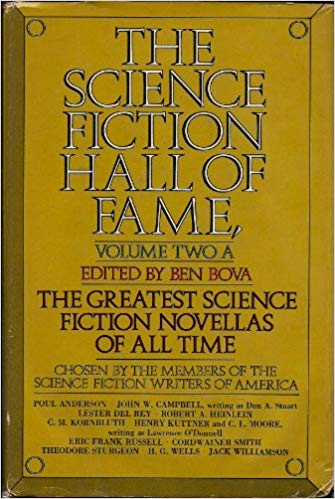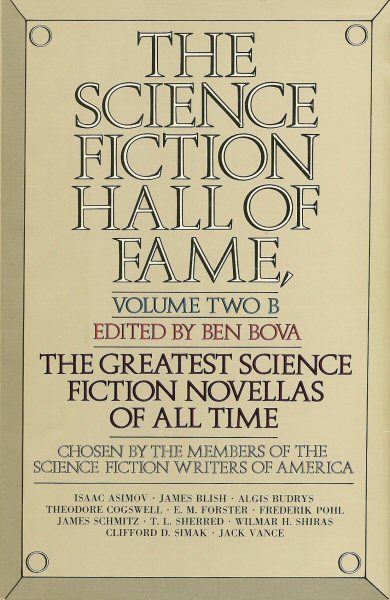

Ben Bova’s two-volume collection of The Science Fiction Hall of Fame, Volumes IIA & IIB (1973) is subtitled: “The Greatest Science Fiction Novellas of All Time.” That’s a bit misleading since the cut-off on the selections is 1961 with Jack Vance’s classic “The Moon Moth.” Bova identifies two wonderful stories that made the cut but were not included. “A Canticle for Leibowitz” by Walter M. Miller, Jr. (1955) was not available for re-publication in 1973, because it had been incorporated in the fix-up novel A Canticle for Leibowitz (1959) that was still in print. “By His Bootstraps” by Robert A. Heinlein (1941) would have been a second work by Heinlein so that classic story got disqualified. All the stories in The Science Fiction Hall of Fame, Volumes IIA & IIB were chosen by the members of The Science Fiction Writers of America. Copies are available online at inexpensive prices. You can’t go wrong with a 1,000 pages of great Science Fiction stories! Do you see any of your favorite SF stories here? GRADE: A (FOR BOTH VOLUMES!)
TABLE OF CONTENTS:
Volume 2A
Introduction by Ben Bova i
Poul Anderson “Call Me Joe” 1957 1
John W. Campbell “Who Goes There?” 1938 34
Lester del Rey “Nerves” 1942 88
Robert A. Heinlein “Universe” 1941 159
Cyril M. Kornbluth “The Marching Morons” 1951 204
Henry Kuttner and C. L. Moore “Vintage Season” 1946 233
Eric Frank Russell “…And Then There Were None” 1951 275
Cordwainer Smith “The Ballad of Lost C’Mell” 1962 342
Theodore Sturgeon “Baby Is Three” 1952 362
H.G. Wells “The Time Machine” 1895 417
Jack Williamson “With Folded Hands” 1947 487
Volume 2B
Introduction by Ben Bova i
Isaac Asimov “The Martian Way” 1952 1
James Blish “Earthman Come Home” 1953 46
Algis Budrys “Rogue Moon” 1960 85
Theodore Cogswell “The Spectre General” 1952 175
E. M. Forster “The Machine Stops” 1909 228
Frederik Pohl “The Midas Plague” 1954 259
James H. Schmitz “The Witches of Karres” 1949 313
T. L. Sherred “E for Effort” 1947 357
Wilmar H. Shiras “In Hiding” 1948 408
Clifford D. Simak “The Big Front Yard” 1958 442
Jack Vance “The Moon Moth” 1961 493
I have both of these. Very good collections. The only stories are don’t much care for are the Heinlein, Asimov, del Rey and the Schmitz. The Schmitz I consider a bit silly. And the other three are a bit dated and not very well written. A couple of these seem a bit short to be novellas-the Cordwainer Smith at 20 pages. Actually the Smith dates from 1962 and is the most recent.
Steve, I’m guessing the group who voted for these stories had to compromise their choices to fit within the publisher’s page limits.
So many fantastic stories, hard to decide – but well:
E is for effort
And then of course the Sturgeon and the Blish – a bit off from the technology oriented stuff of those days.
I always tell people I count myself lucky to have grown up in those days – every month a new writer appeared.
And there were a few people in Germany, real SF enthusiasts who translated and published English/American SF – probably didn’t get a lot of money for that.
Wolf, James Blish is now known for his Star Trek books rather than his early, brilliant stories. Sturgeon certainly deserves all the accolades!
I think even his ST books grow obscure at this point.
Todd, I don’t see many Star Trek books around anymore. But, there are plenty of Star Wars books!
Phil used The Machine Stops in his class on utopias. That’s about the only one I’ve read. No, wait. I have read The Time Machine.
Patti, Phil chose a classic with THE MACHINE STOPS.
A few years ago, I picked up copies of both of these (IIB is a hardback), as well as Volume I (short stories). Later I got Volume III (Nebula Winners 1965-1969) and Volume IV (Nebula Winners 1970-1974), which I am sure you will be covering in time. I’ve mostly read the first volume so far. Robert Silverberg did a sequel/answer story to C. L Moore’s “Vintage Season” called “In Another Country” and it was fun reading them back to back.
Jeff, I’ve had these SCIENCE FICTION HALL OF FAME volumes for years and finally decided to read a couple. Many of the stories were familiar, but some were not.
With most of the classic SF anthologies you’ve featured some of the stories were sort of familiar and some weren’t. Some I’d never even heard of. But I must have actually read these two volumes because I’m sure I’ve read all the stories even if I don’t remember much about many of them. “Baby is Three” would probably be my favorite, but it’s a tough choice. I read “Who Goes There” after I’d seen the Howard Hawks version of “The Thing”, but before the Carpenter version. My memory of the story is that it was sorta dry and boring, yet it was the source of two of the best SF/horror movies ever made. There was a third version about ten years ago, but the less said about that one the better.
Michael, I agree with you on “Who Goes There.” A bit dry. But, as you point out it generated two classic SF movies.
The third film Did star Mary Elizabeth Winstead…
Darn good anthologies, both of them. I have most of the stories in other books, but this is a nice set and would be a good introduction to the genre for the new reader wanting to get some history. As an Anderson fan, “Call Me Joe” would be the favorite here, but the Sturgeon, Caldwell and Pohl are also very good indeed.
Rick, you’re right about THE SCIENCE FICTION HALL OF FAME volumes being a good place to start for a new SF reader.
I listened to Volume 1 and Volumes 2A and 2B when they came out on audio last year. This really is a fantastic collection. Sure I could argue with some selections, and bitch and moan because other favorites were left out, but overall its a tremendous tribute to classic science fiction. I highly recommend listening to the audio version.
Jim, I’ll track down the audio books and give them a try!
I’ll plump for the Sherred, the Kornbluth (because I see it as so widely misunderstood, and also like it in its grimness), and the Wells, as among the first adult sf I read. The Moore, too, now that I think about it a bit more…so to write.
Damon Knight is among the most obviously missing, and probably Leigh Brackett. They cut off the first volume before the Nebulas started happening…odd that they found nothing in the same league among novellas in ’63-’65, as they did with shorter work right up to ’64 and Zelazny.
Todd, timing is everything.